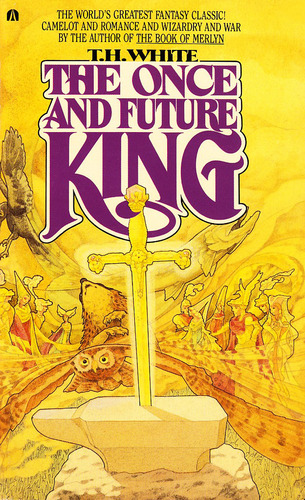Suddenly I feel rather superfluous.
But! It keeps me humble, helps me learn (you never stop that, surely), and gives me an excuse to use the word "superfluous," which is, really, the answer in the question. Talk about a self-defining word.
Like floccinaucinihilipilification.
The estimation of something as valueless.
For a $10 word like that, it's rather an ironic definition.
But to Tolkien. The man was a prolific writer and the founder (in my humble opinion) of Modern Fantasy as we know it. Of course, he built a lot on traditional tales, old cultures, languages, etc. But using those tools he built a world and a series of worlds that have forever changed the way we look at high fantasy.
On a purely personal note, it was reading The Lord of the Rings by J.R.R. Tolkien that first gave me that *ding*, that epiphany:
I want to be a writer.
My life has never been the same ever since, and after putting down Fellowship of the Ring I was forever hooked. I read the trilogy (literally) to pieces, acquired every Tolkien book I could put my hands on, including a biography about Tolkien. I never read biographies. But I read that one, and by gum I enjoyed it. I need to re-read it, thinking of. Including the stack of Tolkien books and Tolkien-related books that are currently piled next to my bed.
I also very happily collect editions of The Lord of the Rings. I'm missing just one of the '60s edition and two of the original edition I read for the first time. I'd love to get my hands on the cloth-bound editions that have Tolkien's original concept art, as well as the new leather-bound editions.
And yet...and yet...Tolkien continues to amaze. His published works are a study in literature and history and writing in and of themselves, but here today I stumbled across this compilation of Tolkien's tips for writers, and they could not be more accurate from what I have observed and learned on my own writing journey.
He starts, of course, with the most important ones first. Pride. The first three tips all have to do with overcoming personal pride, stubbornness, and sensitivity. You need all of these to be a good writer, but you need to know when to set them aside to take edits, critiques, and criticism. Sometimes they'll be hard to hear. But you must hear them out and then you can go through them later with a keen eye and decide if you want them or not.
That's a key point -- I always tell my editor to give whatever comments she has, because in the end, the final decision is up to me. I can always say, "No, I don't agree with that change." But I can't agree with an edit she doesn't make, nor can I disagree with it. It could be she has a brilliant suggestion to make, but if she held back out of fear of offending me, then that would be a shame and a crime to the creative piece.
And if someone gives me advice that I don't want to use, then that is my own decision. But to immediately react without first analyzing the suggestions is unwise. Write them down, copy them down, whatever you need, and then go through them again, perhaps with another editor or beta-reader. Talk them through. If they are worth something, then you can integrate them-- either altered or verbatim. Edits can always in turn be edited, and mayhaps they will spur another thought of yours. Or, if they are not a direction you want to take, you can happily be confident in your own decisions and put the suggestions aside.
I have only written on the first three (out of ten!) of Tolkien's suggestions and tips, but read them all and put a leaf in your book on them. Each one has something you can think on and learn from.
If you're having trouble in your writing, try something new out.
If you're feeling downcast about your writing and insecure, draw some encouragement from these tips.
If you need some prompts to get you over that writing hump, go and look at your neighbors.
That sounds odd. On second thought, maybe just go to a cafe or something. Get a latte. Surreptitiously take notes. Drink your tea. Enjoy putting funny hats and bizarre languages on the people you see around you.





